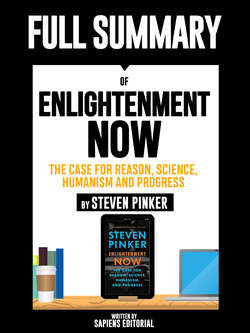Full Summary Of "Enlightenment Now: The Case for Reason, Science, Humanism and Progress – By Steven Pinker"

Реклама. ООО «ЛитРес», ИНН: 7719571260.
Отрывок из книги
There are plenty of reasons to be optimistic about the human race: since the 18th century, when the era of reason began, humanity has managed to reduce illness, poverty and violence, even though these regrettable elements still exist today. However, even if they have not yet been completely eradicated, it is undeniable that we live in a world where superstitious, warlike and racist thinking is criticized by the majority. The key to obtaining this optimistic perspective is to put the history of humanity in context, and to be aware of the objective progress that has been achieved.
The goal of this book is to defend the ideas that support the modern era and whose intention is, in truth, to continue fighting to build a better world. Steven Pinker presents us with a refreshing and hopeful prose, above all because his arguments are based on real data and statistics that start from “The Enlightenment” as a watershed between a dark humanity and another governed by reason.
.....
If you are familiar with universal history, you will know that there was a time when bad weather was the product of the fury of the gods, evil creatures reigned in the depths of forests and oceans, and religion looked favorably on torture and murder in the name of faith. Ignorance produced fear and paranoia, and humanity cried out for an invigorating change. The Enlightenment, also known as the age of reason, was the historical and decisive point that shaped the future of Western culture, changing the course to finally emerge from obscurantism.
The pillar of this renovating era was the reason, which gave people the power to free themselves from religious authoritarianism and its manipulative leaders. Reason referred us to everything that were objective facts and not mere unprovable superstitions. For example, before reason entered the picture, slavery was a common practice and was accepted despite its barbarity, because it was justified as being something normal. Applying reason put in this in doubt and, although the process was slow, finally its abolition was the most logical result.
.....